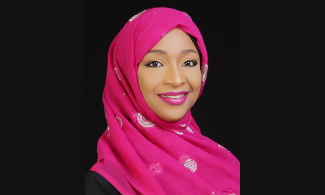The Federal Government has committed to its plan to generate $100 billion from Nigeria’s creative economy.
Hannatu Musawa, Minister of Art, Culture, Tourism and Creative Economy, also said that the government was committed to the creation and sustenance of two million jobs in the sector.
She stated this at the launch of: “Project to Advance Evidence-Based Policies to Support Policy Making to Enhance the Contribution of Creative Sectors and Industries to Sustainable Development,” in Abuja.
The News Agency of Nigeria reports the project is supported by the European Union and United Nations Education, Scientific and Cultural Organisation.

According to the minister, the cultural, creative and tourism sectors are a critical component of our national economy and remain a significant player in “our national development”.
Musawa, represented by Roshan Nanayakkara, Special Assistant on Monitoring, Evaluation and Heritage, said it was also President Bola Tinubu’s Priority Number 7, tagged: “Accelerate Diversification Through Industrialisation, Digitisation, Creative Arts, Manufacturing and Innovation.”
Also Read:
- Paternity dispute: Court cautions ex-minister’s lawyer over frivolous adjournment
- Afenifere appoints Dele Farotimi as Organising Secretary
- No better time than now for 24-hour port operations -Ministers, others
- Ibom Entertainment Forum begins membership re-validation exercise
- Sanwo-Olu celebrate ex-Deputy Governor Pedro at 70
She said: “The prioritisation of the sectors are reflected in the presidential decision to create a sector specific Ministry of Art, Culture, Tourism and Creative Economy to enable and develop the sectors for the increase of sectoral GDP contribution by generating $100 billion and the creation and sustenance of two million jobs.
“For this goal to be achieved, our first step is to enable the industry for rapid development through key initiatives outlined in our 8-Point Plan.
“Key amongst the components of this plan is the development of policy and regulatory frameworks for the advancement of the sectors.
“This is significantly reflected in our efforts to ensure the development, review and launch of three separate policies in one year.
“These policies include: the National Intellectual Property Policy and Strategy (NIPPS); the National Cultural Policy and the National Tourism Policy.”
Musawa said these key policy frameworks would aim to support their relevant industries by ensuring alignment in objectives, enabling regulations, and adequate government support for the industry.
She added: “Let me assure you, President Bola Ahmed Tinubu is focused on ensuring sustained partnerships for national development.
“The President is also keen on creating the right framework that encourages ease of doing business, serves the public interest and helps us attract investment into the cultural, creative and tourism sectors of the economy.”
Abdourahamane Diallo, the Head of Office, UNESCO Abuja Regional Office, said the EU-UNESCO project was an initiative implemented by UNESCO to support the government, through the ministry, to develop the frameworks for cultural sectors.
According to Diallo: “It is about culture, policy.
“It is about capacity building of state actors, agencies in the areas of culture and it is also providing a platform for international cooperation in the area of culture and cultural policy.”
Gautier Mignot, the Ambassador, EU Delegation to Nigeria and ECOWAS, said the project was to strengthen the creative industry and its contribution to sustainable development in the country.


